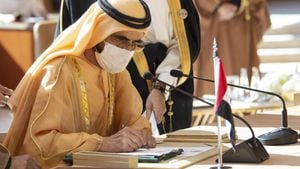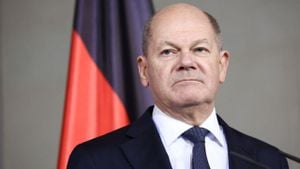On election day, two of Germany's political heavyweights cast their votes, each representing their respective parties amid differing expectations. Chancellor Olaf Scholz, leader of the Social Democratic Party (SPD), and Friedrich Merz, head of the Christian Democratic Union (CDU), participated actively, signaling their commitment to the political process.
Scholz opted for a dose of exercise before heading to his polling station, enjoying a morning jog around his neighborhood in Potsdam. Accompanied by his wife, Britta Ernst, he arrived at the polling station to exercise his civic duty, lifting his thumb optimistically for waiting cameras. Despite previous successes, there loomed the shadow of declining popularity reflected in recent polls, where the SPD was reportedly slated to receive only about 15% of the vote—a historically bad figure for the party.
On the other hand, Friedrich Merz cast his ballot at the Schützenhalle polling station located close to his home in Arnsberg, North Rhine-Westphalia. Joined by his wife, Charlotte, Merz displayed confidence, stating simply, "It will be good" before casting his vote. Having previously secured 40.4% of the electorate's backing during the 2021 elections, Merz seemed assured of his chances this time around as polling indicated the CDU stood well above the SPD.
The backdrop of the election was the British influence of recent events, with Scholz’s earlier popularity giving way to challenges as he faced the reality of potential defeat. Dressed casually and appearing relaxed, he nonetheless bore the weight of expectations on his shoulders. With the SPD's downward trend reflected across polls, questions arose about the party’s future leadership and direction.
Conversely, Friedrich Merz, who has worked hard to rebuild CDU’s stature after years of political turbulence, took pride as he headed to the polling booth. The once stable seat of Hochsauerland was key for Merz and illustrated the shifting tides within German politics. This bastion has been historically reliable for the CDU, reflecting their resilience over various political challenges.
The election held not just immediate importance for those participating, but presented serious ramifications for Germany's broader political environment. Poll analysts suggested considerable indecision among voters may influence the country's political alignment moving forward. Amid signs of wavering support for the struggling SPD, the potential move back to CDU leadership discussion was palpable.
Both candidates made it clear through their voting experiences—the stakes of this electoral battle stretched beyond mere numbers. For Scholz, each election remains pivotal; maintaining momentum from his earlier election was key to avoiding what would be perceived as major setbacks for his party. Meanwhile, Merz's leadership of the CDU hinged on restoring confidence, political stability, and presenting viable governance options for voters seeking alternatives.
The outcome of this election would not only determine the next Chancellor but could also redirect Germany's socio-political framework. Will Scholz defy the polls against all odds, or will Merz cement his party’s resurgence? This election day served as the first act of what could potentially be significant shifts along the political spectrum.
Both Scholz and Merz’s voting experiences captured the essence of this democracy—a commitment to participation and engagement, regardless of the uncertainties overshadowing their parties’ standings. With the future promised by the election, political analysts now closely observe the results for insight on Germany’s immediate political horizon.



